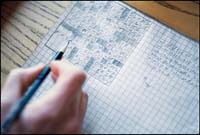 |
 |
| current issue |  |
past issues |  |
send a letter/news |  |
address update |  |
advertise |  |
about us |  |
alumni home |
Features
Still PuzzledThe key to writing world-class crossword
puzzles is a slightly zany take on life
by Jane Harrigan
 Photo by Perry Smith |
A
t a tiny table in a noisy Harvard Square cafe, Brendan Emmett Quigley '96 is narrating an act of creation. Head bowed, pencil moving restlessly across squares of graph paper, he intones what sounds like the muted voiceover for a documentary. The plot summary might go like this: UNH English grad, refusing to abandon his passions, cobbles together a living as a rock guitarist and nationally known constructor of crossword puzzles.
On the table, Quigley has neatly aligned four sharpened pencils and two fat pink erasers. He has cleared space by loading into his backpack the huge, meticulously maintained green scrapbook of his published work--puzzles that appeared in the New York Times, New York Sun, Wall Street Journal, Washington Post, Games magazine and elsewhere. Now he is ready to construct.
He prints HARRIGAN, in his guest's honor, in the squares at the top of the graph paper and then, aligned directly below it, ONE ON ONE.
Even as the voice muses, "Let's see if we can think of another eight-letter word," the pencil is adding RICHARD I below the first two.
"This is raw, improvisational construction," he says. "I'm designing the pattern as I'm going." Usually he starts a puzzle by mapping out a symmetrical pattern of black and white squares, then filling in the words. Today he's doing the opposite. His voice trails off, then picks up again as the pencil moves on.
"Why don't we do something fun?" Descending from the A in HARRIGAN, he checks out the next two letters, N-D, and quickly prints AND I QUOTE.
"Yes! Great entry--something everyone says but no one really notices."
The process continues this way for 20 minutes, pencil and eraser and voice racing each other up and down and sideways, brain plotting ahead more sequences and combinations than the average one-track mind can conceive. "What if I...?" he wonders. "No, but then that would..."
 Photo by Perry Smith |
An -ILL ("Bill Blass?") suddenly takes its place in the grid as GILLIGAN, followed by AT MOST and ST THOMAS and US STEEL.
Quickly, intersecting the T in AND I QUOTE, the pencil adds MRS WHITE. "Is that a character in Clue? I hope so--look at all those consonants! Kind of wild."
Finally, when it's time for his visitor to leave, Quigley shakes off creation fever and sits up, his red-tan glasses glinting beneath wavy red-tan hair. "Wow," he says almost breathlessly, surveying his work with surprise. "This is making me look far more amazing than I actually am."
The hundreds of passionate solvers who frequent the online Crossword Forum of the New York Times would beg to differ. They find BEQ, as they call Quigley (and "a BEQ," as they call any one of his puzzles), plenty amazing.
"He's not the youngest writer of crosswords for the Times, but he's probably the hippest," say Emily Cox and Henry Rathvon, who moderate the online forum. "His vocabulary is spiced with up-to-date slang and popular lore that adds crackle and challenge to the usual crossword."
"It's the quality of the vocabulary above all," says Will Shortz, the Times puzzle editor, famous for his weekly appearances on National Public Radio. He especially praises Quigley's "interesting, familiar phrases from real life," such as AND I QUOTE or, Shortz's favorite, WHY YOU LITTLE . . . (clued as "Angry parent's yell"). When St. Martin's Press wanted to publish a series of books featuring puzzles by "superstar" Times constructors, Shortz suggested Quigley as the sole author of Volume I, due out this year.
Page: 1 2 Next >Easy to print version
blog comments powered by Disqus

